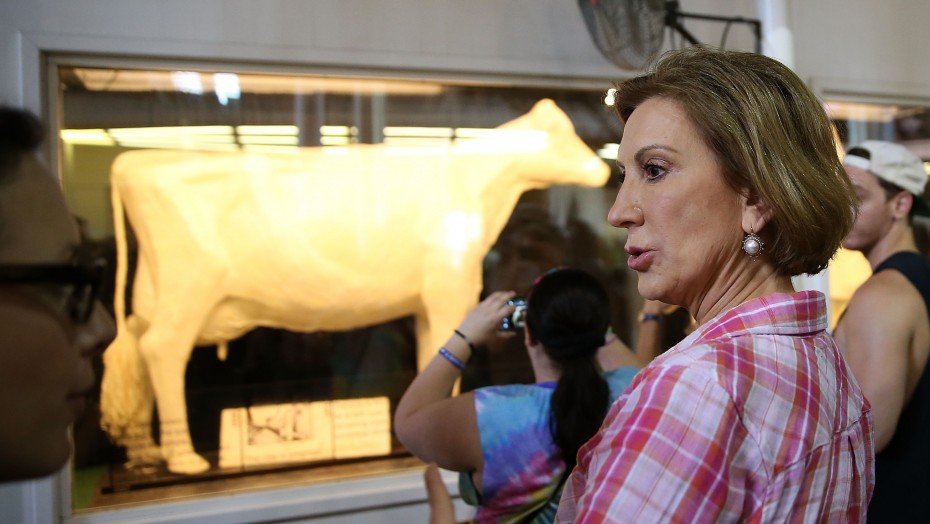
August 17, 2015 Carly Fiorina didn't want to give a speech on Monday when she took the stage at the Des Moines Register soapbox at the Iowa State Fair. Instead, she proceeded quickly to the question-and-answer portion, fielding questions on everything from abortion ("Planned Parenthood must be defunded") to U.S. energy production ("a single nation acting alone will make no difference at all" on climate change).
The first question Fiorina fielded was about the minimum wage, and how she thinks raising the wage would affect the U.S. economy. Fiorina, a former CEO of Hewlett-Packard, answered as she had before, but included an interesting argument against raising the wage.
First, I believe that minimum wage should be a state decision, not a federal decision. Why? Because it makes no sense to say that the minimum wage in New York City is the same as the minimum wage in Mason City, Iowa," Fiorina said.
Secondly, we have to remember that a lot of minimum-wage jobs are jobs where people start, and in those jobs they learn skills to move forward. So we need to be honest about the consequences of raising a minimum wage too high. One of the consequences is that young people who are trapped in poor neighborhoods will have less opportunities to learn skills and move forward.
The idea that you can draw a line between higher minimum wage and fewer opportunities in poor neighborhoods is an alluring hypothesis for Republican primary voters, and one that is very hard to bear out in empirical research. Economists can't even agree whether raising the wage would lead to job stagnation or not, much less the social capital affected by it.
Real job growth, Fiorina continued, is not created by the federal government mandating higher wages, but by allowing smaller businesses to thrive. Forcing smaller businesses to pay higher wages, Fiorina argued, would price them out of the market.
We are crushing them under the weight, the complexity, the cost, the power of a federal government that frankly advantages the big, the powerful, the wealthy and the well-connected, and is crushing the small and the powerless," she said. "Every time we destroy a small business or we destroy a community bank, we are destroying the opportunity for someone to get that first job, learn skills, and get a better job.
So, is raising the minimum wage actually a job killer? It's hard to say conclusively, and has led to some infighting among U.S. economists. A 2007 literature review from the Federal Reserve Board of Governors concluded that minimum-wage increases reduced employment. More recently, a study found little correlation between metro areas raising their minimum wages and their job-growth rate, suggesting that raising the minimum wage does not impact employment.
While raising the federal minimum wage to $15 an hour—an idea Sen. Bernie Sanders and former Maryland Gov. Martin O'Malley have backed—would definitely increase individual employee income, that could come at the cost of jobs. A 2014 report from the Congressional Budget Office projected that raising the minimum wage from $7.25 to $10.10 an hour would lead to a reduction in 500,000 jobs nationally, but roughly 16.5 million workers would see their weekly earnings increase.
With not enough research to definitively say which side is right, voters will have to decide which side they trust more. And on Monday in Iowa, Fiorina made a good sales pitch that she's the person voters should trust.
- Publish my comments...
- 0 Comments
